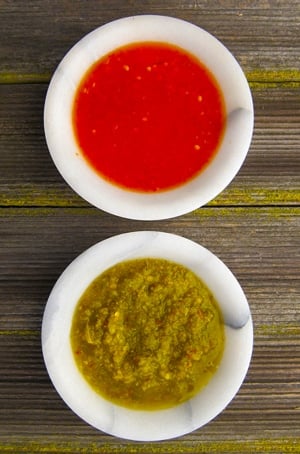Fermented, Tabasco-Style Hot Sauce
5.0
(25)
Your folders
Your folders
Prep Time: 30 minutes
Total: 30 minutes
Servings: 1
Author : Hank Shaw

Ingredients
Export 4 ingredients for grocery delivery
Instructions
Step 1
Roughly chop the chiles and compost the stems. Blitz the chiles in a food processor or blender with the salt and water until you get a rough paste or slurry, depending on how much moisture there is in the peppers themselves. I keep the seeds in the chiles, but if you want a milder sauce, remove them.
Step 2
Put the mash into quart mason jars and cap them loosely. "Burp" the caps at least once a day to let out escaping gases and let air in. The chiles will ferment like this for at least a week, and sometimes up to 3 weeks. When the chiles settle down, add the oak cubes, distributing them evenly throughout the jars. Tighten the lids and store the jars in a cool, dark place. I kept mine in my salami fridge, which is 55°F. A basement is fine, as would a fridge. Tabasco keeps their mash barrels at ambient temperatures, which in Louisiana can top 100°F. I am working on a batch fermented this way now, and I see no reason it won't work. Don't let the mash freeze, however.
Step 3
Keep the mash like this no less than 3 months, and up to 2 years. When you are ready to finish the sauce, mix the mash with the vinegar.
Step 4
You now have two choices: You can do what Tabasco does and return the mix to the jars, shake them every day for a month and then strain out the pulp and seeds. Or, do what I do and keep all that pulp, which will give the sauce body and thickness. If you choose my method, you will need to really blend the sauce and stabilize it -- otherwise the sauce will eventually separate and will need to be shaken up before each use. To do so, dissolve the xanthan gum in 2 tablespoons of water and add it to the blender. Blend for a solid minute. Let the sauce rest for 1 hour before bottling so any trapped air in sauce (from the blending process) can escape. Bottle and store. The sauce will keep for a year or more.